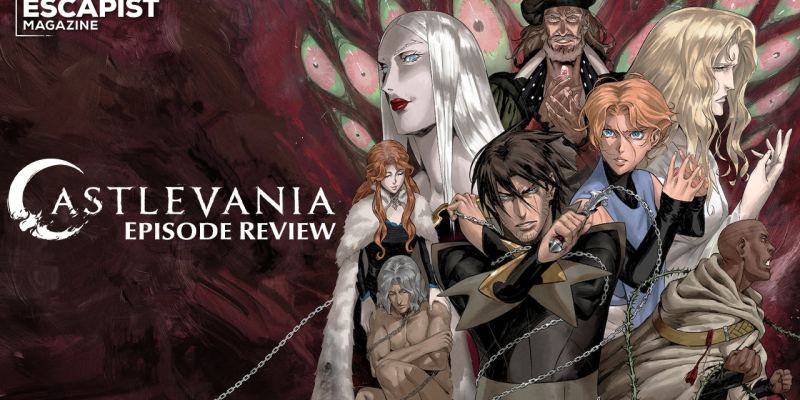The following review contains spoilers for Castlevania season 3, episode 7, “Worse Things Than Betrayal.”
Coming off the heels of the best episode in the show’s history, “Worse Things Than Betrayal” is still a solid, if not extraordinary episode. The season seems to be building toward something dramatic and worthwhile, but unfortunately, before we can get to the good stuff, we need to spend time with Alucard (James Callis).
The Alucard plot is frustrating. He is in a thematically rich environment as the bearer of knowledge for both Dracula’s empire and the Belmont Vault, and he does virtually nothing with it. He takes Sumi (Rila Fukushima) and Taka (Toru Uchikado) into the vault to teach them the knowledge of the Belmonts, with Taka in particular focused on the methods of how to kill vampires and humans, but we don’t actually see Alucard impart any of the knowledge to them. Alucard seems to genuinely care about teaching the next generation of vampire hunters, and it looks like Sumi and Taka might be taking advantage of that generosity. The problem is that we haven’t spent enough time with either of them to get a feel for their characters or see exactly what Alucard is teaching them.
We know that they were slaves who escaped from a vampire in Japan, and we get an occasional training scene, but often nothing to enhance their characters. Worst of all, their scene this week does further who they are as characters significantly, but they’re still just not interesting to watch. Alucard is the one who is compelling, not Sumi and Taka, yet the show is still painting them as the main characters of this Castlevania side plot.
Isaac (Adetokumboh M’Cormack) is a better example of a character fleshed out successfully in recent Castlevania episodes. After stopping in an abandoned village, Isaac comes to the realization that his goal is virtually impossible as it stands. He has the ability to create monsters, but the size of his army pales astronomically in comparison to Carmilla’s. A witch recommends that Isaac should go to a local wizard who brainwashed all the inhabitants of local villages to make a slave army and use them as fodder for his forces, an idea that is understandably compelling to him.
Isaac’s journey this season has been one of self-discovery, seeing both the best and worst in humanity. We’ve seen what humanity is capable of thanks to the monster’s story last episode, but whenever Isaac has had a chance to socialize with other humans, they serve as a potential moral compass for him. While the Captain tried to instill in Isaac that his powers can be used to help people, the witch now attempts to goad Isaac’s need for revenge and to give in to his hatred: two moral extremes, but both having a clear impact on Isaac. The show is building up to an eventual confrontation between him and Hector, and I’m certainly curious to see what Isaac will do when he meets one of the objects of his vengeance, though at this rate that will probably have to wait until next season.
The bulk of “Worse Things Than Betrayal,” as usual, takes place in Lindenfeld. After a brilliant running joke about toilet paper, Saint Germain (Bill Nighy) is able to piece together and confront Prior Sala (Navid Negahban) as tactfully as possible about his plans; his sect wants to revive Dracula. They’re practicing trying to create a portal to Hell to bring him back to life, with the giant Night Creature at the bottom of the priory being used somehow. Sala poorly tries to brush all of this off, but Germain’s guess looks to be dead on. If so, then the monk’s plan is doomed to failure.

While Sala and his order have no real idea about Dracula’s motivation since they weren’t involved in past Castlevania seasons, Dracula’s goal always was to enact vengeance on the world for killing his wife. Sala says himself that Dracula and his wife are both in Hell, but if Sala’s plan is to bring Dracula back to life, why would Dracula want to be revived? He’s finally reunited with his wife. If Dracula is brought back without her, then he wouldn’t hesitate to kill everyone that brought him back, followed by seeking his own demise again. Sala’s plan is doomed to failure, one way or another.
The Judge (Jason Isaacs) also gets plenty of development that makes him both more and less trustworthy. We see him helping a child at the start of “Worse Things Than Betrayal” and telling him where to find apples so that he doesn’t have to steal them from a store, while suspiciously wiping his hands after exiting a secret room in the back of his house. The amount of fear on his face when he hears someone approach his door as he’s exiting the room makes it clear that, whatever is in there, he doesn’t want anyone to see it. Based on his own desire to protect the town, I wouldn’t be surprised if he’s some kind of magic practitioner trying to cook something up to prevent Sala’s own magic, probably with more unsavory requirements. Human sacrifice, perhaps?
Things in Lindenfeld are slowly gearing up to a magical conclusion. Night creatures, incantations, portals to Hell, and suspicious activities abound; now all that we need is a fuse to finally blow it all up. “Worse Things Than Betrayal” continues the show’s high standard of quality. Sure, it may not have been the most visually engaging Castlevania episode, one fun hand-to-hand combat scene aside, but the character development and seeding is still excellent. Now all we need to do is wait until all-out chaos breaks out.
